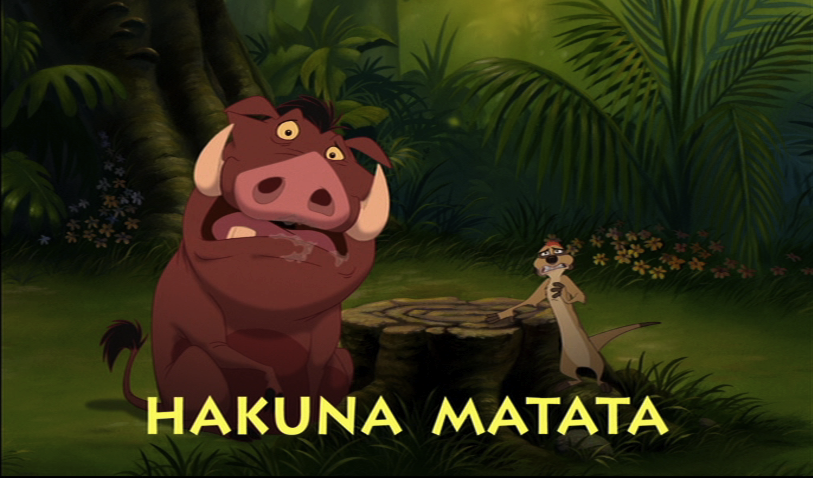Hakuna Matata Meaning
Hakuna Matata Meaning, you may have encountered the phrase Hakuna Matata previously, yet remain uncertain of its significance. In essence, ‘Hakuna Matata’ is a Swahili word signifying ‘no concerns,’ akin to the Australian phrase ‘no worries.’
Swahili, or Kiswahili, is a lingua franca that developed on the eastern coast of Africa and incorporates loanwords from Arabic, Farsi, Hindustani, Portuguese, and Malay. Currently, between 120 and 150 million individuals communicate in Swahili.

The phrase Hakuna Matata gained widespread prominence with the 1994 Disney picture, The Lion King. The concept conveyed by the term is that one should not be distressed by matters beyond one’s control. Tim Rice and Elton John composed the song “Hakuna Matata” for the film The Lion King, which received an Academy Award nomination for Best Original Song and popularized the phrase in the Western world.
the meaning of hakuna matata
“Hakuna Matata,” performed by Pumbaa, the Disney warthog.
Analysis on the meaning of Hakuna Matata
The phrase consists of two Swahili words:
Hakuna ‘there are none/there is none’
Matata, the plural form of the term ‘trouble’
The phrase Hakuna Matata evokes the uplifting sentiment of the song “Don’t Worry Be Happy,” made famous in the 1980s by singer-songwriter Bobby McFerrin.
Following the release of The Lion King, it has been customary for English-speaking tourists in East Africa and other regions where Swahili is spoken to greet one another with the phrase ‘Hakuna Matata.’ In East Africa, Hakuna Matata is utilized not primarily as a welcome, but rather as a reply to a greeting or as a form of condolence.
Hakuna Matata and further Swahili expressions
Hakuna Mata is primarily utilized in greetings, particularly in response to inquiries like as, ‘How are you?’ A possible response could be, ‘No issue or discord – Hakuna Matata.’
It is occasionally employed to acknowledge the completion of a certain work without objection, as in, ‘Can you please assist me with preparing lunch today?’ Douglas Mmari, a Tanzanian radio show host, suggests that the reaction may be ‘Hakuna Matata.’ I do not employ these terms. They represent a form of colloquial language predominantly spoken by visitors, exemplified by the term ‘Jambo.’ Jambo is an additional greeting in Swahili.
Conversely, “Karibu” or “Habari” are the welcoming greetings frequently employed by numerous Swahili speakers.
Another Swahili adage that begins similarly to Hakuna Matata is Hakuna masika yasiyokuwa na mbu, which translates to ‘There is no rainy season devoid of mosquitoes.’ The phrase conveys that every positive aspect is accompanied with negative elements, akin to the Western adage ‘every rose has a thorn.’
Additional Swahili vocabulary to familiarize yourself with prior to embarking on a safari in East Africa includes:
Asante: Thank you
Kwaheri: Goodbye
Safari: Journey
Simba: Lion
Tembo: Elephant
Twiga: Giraffe
“Hakuna Matata,” the song
In the animated film, a meerkat named Timon and a warthog named Pumbaa perform the song “Hakuna Matata” as a philosophical discourse. The name Pumbaa derives from a Swahili term that signifies foolishness, silliness, weak-mindedness, carelessness, or negligence. They perform vocalizations:
Hakuna Matata!
What a wonderful phrase
Hakuna Matata!
Ain’t no passing craze
It means no worries
For the rest of your days
It’s our problem-free philosophy
It is our ideology devoid of problems.
“Hakuna Matata!”
Tim Rice, an English lyricist renowned for his collaborations with Andrew Lloyd Webber, authored the lyrics. Elton John created the music. Rice collaborated with Disney on Aladdin and the theatrical rendition of Beauty and the Beast.
Here is the complete Hakuna Matata song:
Disney’s trademarking of the Swahili phrase “Hakuna Matata” for t-shirt usage incited significant controversy within the African community. Certain activists contend that the trademark supports colonialism, while others accuse Disney of cultural appropriation regarding the Swahili language. They contend that language ought not to be subject to patenting.
This concludes our interpretation of the meaning of Hatuna Matata. We trust you found it beneficial! Therefore, when you wish to avoid taking matters too seriously, recall the significance of Hakuna Matata: “There are no problems.”
We want you to share your perspective on this classic Swahili saying; please convey your opinions in the comments box below.
